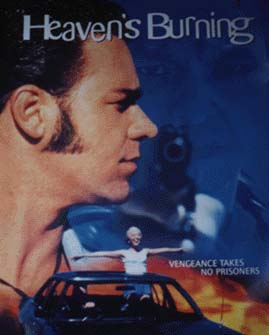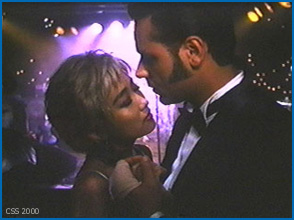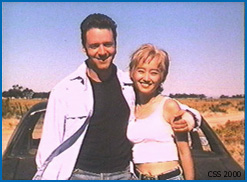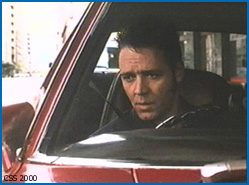
Director: Craig Lahiff
Writer: Louis
Nowra
Also stars: Youki Kudoh (Midori), Kenji Isomura (Yukio), Robert
Mammone (Mahood), Petru Gheorghiu (Boorjan), Anthony Phelan
(Bishop), Matthew Dyktynski (Moffat).
I've read that viewers either love
or hate this film. I admit, I was mystified by it at first,
and perhaps I would have hated it except that I thought
"hey, Crowe seems to be pretty careful about the roles
he takes, there must be something here." On reviewing,
the characters at least deserve some attention, and the
performances of the lead actors are quite effective. Youki
Kudoh is exceptionally watchable: she deftly transforms
what could have been an embarassing stereotype of Japanese
womanhood into a uniquely memorable performance. Even
before she "cuts loose", Midori's disatisfaction
and guilty struggle are powerfully evident.
The character of Yukio, the jilted
husband, is the personification of the Japan that Midori
describes: "Many people in Japan, they have no true
life. Everybody has [a] dream, but they [are] scared to
make [the] dream come true because they [are] raised in
a certain way." Both husband and wife are stiff and
unatural even on this last day of their honeymoon, she with
her doubts, he with his confused enthusiasm. But there is
an essential humanity about Yukio's efforts to share his
optimism.
Although he is oblivious to the
impending rupture in his new marriage, he demonstrates a
besotted affection for his new bride. He is the merry emperor
of a half-silent nation of two. The transformation we witness
as he exits the world of acceptable behavior is as amusingly
unexpected as Midori's evolution into a chatty and sexually
aggressive femme fatale.
 Lahiff adds a twist to sterotypical
light and dark contrast. Where our unrepentant villains,
the inept but very angry gangsters, lurk in the darkness
of night and closed rooms, the protagonists take flight
in bright daylight. Even their romantic interlude at the
B & S dance is only in artificial darkness: they burst
into the bright of day at the end. But the bright light
they move through is not a lush or comforting clarity: it
is a stark, parched landscape, victim of a ten year drought.
There is no soothing greenery, even the sea is too bright,
though it is rumored to "make everything better."
The film does not have resting points, at every turn there
is some kind of disruption. Sexual climax translates into
bondage, the stranger who tells Midori she's beautiful is
a blind man, the recipient of charity and pity is an aggravating
and even belligerant pest. The avenging angel was once a
love-sick groom and obedient company man. Lahiff adds a twist to sterotypical
light and dark contrast. Where our unrepentant villains,
the inept but very angry gangsters, lurk in the darkness
of night and closed rooms, the protagonists take flight
in bright daylight. Even their romantic interlude at the
B & S dance is only in artificial darkness: they burst
into the bright of day at the end. But the bright light
they move through is not a lush or comforting clarity: it
is a stark, parched landscape, victim of a ten year drought.
There is no soothing greenery, even the sea is too bright,
though it is rumored to "make everything better."
The film does not have resting points, at every turn there
is some kind of disruption. Sexual climax translates into
bondage, the stranger who tells Midori she's beautiful is
a blind man, the recipient of charity and pity is an aggravating
and even belligerant pest. The avenging angel was once a
love-sick groom and obedient company man.
All around, the story is riddled
with surprises and inconsistencies, but tracing them can
be amusing if you let it.
FROM CANOE.COM:
Friday, January 23, 1998
Much to Crowe about
By LOUIS B. HOBSON -- Express Writer
There's not the slightest question that the Australian road
movie Heaven's Burning is a homage to the films
of Quentin Tarantino. Colin (Russell Crowe) and Midori
(Youki Kudoh) are two desperate strangers who are thrown
together by fate.
 Midori
is a young Japanese bride who abandons her husband on the
last night of their Australian honeymoon. Colin needs
some fast cash so he agrees to be the get-away driver on
a bank heist for a trio of Afghani thugs. The heist goes
terribly wrong. One of the thugs is killed in the bank.
The other two take Midori hostage and are only prevented
from executing her when Colin kills one of them instead.
Suddenly Colin and Midori are on the lam, with police, the
remaining thug and his father and Midori's husband in hot
pursuit. Midori
is a young Japanese bride who abandons her husband on the
last night of their Australian honeymoon. Colin needs
some fast cash so he agrees to be the get-away driver on
a bank heist for a trio of Afghani thugs. The heist goes
terribly wrong. One of the thugs is killed in the bank.
The other two take Midori hostage and are only prevented
from executing her when Colin kills one of them instead.
Suddenly Colin and Midori are on the lam, with police, the
remaining thug and his father and Midori's husband in hot
pursuit.
Heaven's Burning, which
opens today at the Garneau Theatre, is Natural Born
Killers with restraint and Pulp Fiction with heart.
It's crazy, wild, eccentric and violent but, unlike Tarantino's
films, it is also believable and that's what makes it scarier
and more appealing.
Screenwriter Louis Nowra is an Australian
playwright, novelist and screenwriter.
He knows how to flesh out characters and to give them realistic
dialogue. It's nowhere near the glib and showy dialogue
that Tarantino routinely serves up but it rings true. This
is how real people think and speak. There are distant
echoes of such classic crime-spree road movies as Bonnie
and Clyde and Badlands in Nowra's script and
Craig Lahiff's direction, but it's also clear they want
the Tarantino comparison. They provide a blaring music track
to heighten the intended emotional responses and they even
have Crowe look like a slimmer John Travolta from Pulp
Fiction.
That's where the comparison ends.
Crowe is an actor of complexity and depth.
There's no denying the dangerous aura to his masculinity,
but there is also a vulnerability that few American actors
either have or are willing to show.
You are always aware Crowe can and
will kill to protect himself or those he loves, but it's
also clear he can be killed. His bravura is not invincible.
Kudoh's fragility and alluring femininity are just as deceptive.
She is no retiring damsel in distress. The relationship
that builds between Crowe and Kudoh is winsome, making it
a striking contrast to the violence that invades and pervades
their lives.
Heaven's Burning is a road-revenge
thriller that explodes with fury and keeps delivering surprises
until the final frame.
Friday, January 23, 1998
By BRUCE KIRKLAND
Toronto Sun
Heaven's Burning is an Australian crime thriller that once
again (and again, and again) invokes the Bonnie &
Clyde motif, as if we're not already sick of it.
 Even the movie's star, Russell
Crowe, has spoken out against his own movie because it turned
out to be less of a political satire and more of a thriller
than he had anticipated when he read the original script
and shot the movie. Even the movie's star, Russell
Crowe, has spoken out against his own movie because it turned
out to be less of a political satire and more of a thriller
than he had anticipated when he read the original script
and shot the movie.
He's right, of course. What is on screen now is a sensationalistic
romp that trades on tawdry romance, senseless crime and
wanton death. The wacky, stylized film has plenty of satirical
tone but very little satirical content, except for an out-of-context
diatribe about 'foreigners' screwing up Australian culture,
whatever that's supposed to be.
All that said, Heaven's Burning is still a hell
of a B-movie romp thanks to the charismatic Crowe, best
known now as one of the American cops in the Oscar-bound
L.A. Confidential. If you want to see how good
and bloody determined an actor Crowe is, watch him making
the most of the least in Heaven's Burning.
With his homegrown accent back in his mouth, with his sparkling
eyes looking bewildered, Crowe plays an aimless drifter.
In a weak moment, he is persuaded by Afghani-Australian
friends to help out in a Sydney bank robbery. I said Crowe
was good. I didn't say he was a good guy here.
Meanwhile, we've already met an unhappy yet flaky Japanese
bride (Youki Kudoh, the tourist who wanders through Memphis
in Mystery Train). She fakes her own kidnapping during her
honeymoon in Sydney. She happens to be in the bank and ends
up really being kidnapped by the crooks.
One unfortunate thing leads to another crazy thing, people
die and Crowe and Kudoh end up together. They hit the road,
the usual chase is on and they try to outrun the other crooks,
the police and the bride's now psychotic husband. The trick
is trying to
figure out who's going to die violently, how and when.
Director Craig Lahiff, working from Louis Nowra's script,
tries (and ultimately fails) to get us to see everything
through two cultural points of view that work in opposition:
That of the cynical Australian man who awakens to the fresh
energy of his traveling
companion and that of the naive Japanese woman who is simultaneously
rejecting her own society.
Lahiff needs a more delicate manner and a more sophisticated
layering of images to pull something like that off. Especially
in a movie that features bloodbaths in the Outback.
Back to Top
Thanks to the Crowe
Slide Shows site for the screen captures! |